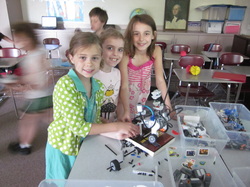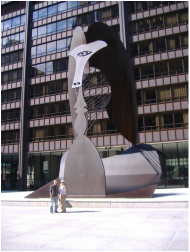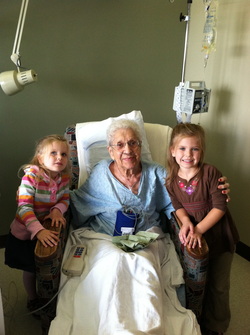
Week One
Lichtenstein and Fashioning the Object
Knowing I would finish on May 23, I made plans to see the Art Institute the following Tuesday. The Lichtenstein exhibit had been showing since earlier in May. I expected the pop art, but had no idea how much variety Lichtenstein created in his work. I read every wall in the exhibit because it is so enlightening. I admire the courage of the artists that can plunge ahead without regard for the opinions of critics. As inspiring as it was, I decided to see if there were any new features in the Modern Wing. I was not disappointed. The new exhibit there was Fashioning the Object: Bless, Boudica, Sandra Backlund.
I was first drawn in to a room that reminded me of the "Happenings" of the sixties. Chains and beads hang as makeshift walls and display objects of the imagination. Comfortable chairs inside these areas invite you to sit and experience the unusual surroundings. Heiss in Paris and Kaag in Berlin have formed a fashion company called Bless. They communicate mostly through Skype and email. This cyberspace liaison has created objects from everyday items that radically alter our view of reality.
Boudicca reminded me of the Balenciaga exhibit I saw about a year ago in San Francisco. Their styles are completely different, but they both design clothing that challenges everyday styles. My favorite was the Tornado Dress, which is demonstrated in a video from start to finish.
The best part of the exhibit was Sandra Backlund, who creates knitted fashions by hand that are stunning.
Lichtenstein and Fashioning the Object
Knowing I would finish on May 23, I made plans to see the Art Institute the following Tuesday. The Lichtenstein exhibit had been showing since earlier in May. I expected the pop art, but had no idea how much variety Lichtenstein created in his work. I read every wall in the exhibit because it is so enlightening. I admire the courage of the artists that can plunge ahead without regard for the opinions of critics. As inspiring as it was, I decided to see if there were any new features in the Modern Wing. I was not disappointed. The new exhibit there was Fashioning the Object: Bless, Boudica, Sandra Backlund.
I was first drawn in to a room that reminded me of the "Happenings" of the sixties. Chains and beads hang as makeshift walls and display objects of the imagination. Comfortable chairs inside these areas invite you to sit and experience the unusual surroundings. Heiss in Paris and Kaag in Berlin have formed a fashion company called Bless. They communicate mostly through Skype and email. This cyberspace liaison has created objects from everyday items that radically alter our view of reality.
Boudicca reminded me of the Balenciaga exhibit I saw about a year ago in San Francisco. Their styles are completely different, but they both design clothing that challenges everyday styles. My favorite was the Tornado Dress, which is demonstrated in a video from start to finish.
The best part of the exhibit was Sandra Backlund, who creates knitted fashions by hand that are stunning.
 LaSalle Bank
LaSalle Bank
Week Two
Appointments
is week was appointment week. When I had young children, I used every sick day. My parents helped take care of them if they had to miss school and I had to work, but I always wanted to hear what the doctor had to say. The last ten years I was an empty-nester and seldom used a sick day. It got to be a matter of pride that I hadn't used them, so I made appointments whenever I had a day off or a break in the school year. Now I can make appointments during the day! It's amazing how easy it is to get an appointment when you have flexibility. So I have kept two appointments on Monday and Tuesday and will keep two on each day Wednesday and Thursday. Monday and Wednesday afternoons will be spent cooking for my ninety-six year old mother. The glorious part of the week was actually meeting with my other Quilt Bee member, Judy. I had to put that on hold for most of last year. I also plan to make her husband a prayer shawl as he goes through chemo. My body is requiring 9 hours of sleep at night, and I still found myself napping Sunday and Monday. I knew I was tired!
One important task I have started is to do some volunteer work for Poets & Patrons. I updated the web site last week, but still have some writing to do and details to work on to bring the web site up to date. Then I will start to write for the Taproot Foundation. Today was a very long day when I was cleaning the house. So much more time to do the tasks that I used to cram into 5-9 PM!
Appointments
is week was appointment week. When I had young children, I used every sick day. My parents helped take care of them if they had to miss school and I had to work, but I always wanted to hear what the doctor had to say. The last ten years I was an empty-nester and seldom used a sick day. It got to be a matter of pride that I hadn't used them, so I made appointments whenever I had a day off or a break in the school year. Now I can make appointments during the day! It's amazing how easy it is to get an appointment when you have flexibility. So I have kept two appointments on Monday and Tuesday and will keep two on each day Wednesday and Thursday. Monday and Wednesday afternoons will be spent cooking for my ninety-six year old mother. The glorious part of the week was actually meeting with my other Quilt Bee member, Judy. I had to put that on hold for most of last year. I also plan to make her husband a prayer shawl as he goes through chemo. My body is requiring 9 hours of sleep at night, and I still found myself napping Sunday and Monday. I knew I was tired!
One important task I have started is to do some volunteer work for Poets & Patrons. I updated the web site last week, but still have some writing to do and details to work on to bring the web site up to date. Then I will start to write for the Taproot Foundation. Today was a very long day when I was cleaning the house. So much more time to do the tasks that I used to cram into 5-9 PM!
 America Windows, Marc Chagall
America Windows, Marc Chagall
Week Three
Ordinary Can Seem Down
After the pink cloud of last week, this week felt like a downward ride on a roller coaster. Life can be so ordinary. I continued with appointments and added cooking for my mom twice a week. She is 96 and is having trouble doing just about anything. Did I mention she still lives at home? Alone? I stayed in the area to be available to her, as she had been available to me when I needed help raising my kids. I found myself taking her cat to the vet, only to learn it had a major build-up of fluid in its body. Three trips to the vet later, we knew there were 300 ccs of fluid, but we didn't know what. I brought her home and started her pills, and she perked right up. Still waiting to hear what is wrong with her. My cat was fine, but two shots later I was reminded that pets are expensive. Has Consumer Reports done a study about why vet bills are so high?
Last year I started a custom of taking Mom out for supper on Fridays. Friday rolled around and we were together again. Then I realized my younger brother would have Mom on Sunday, so that meant I would be filling in on Saturday. This is all free choice, mind you, but I was beginning to feel rather lonely and isolated from my friends. I haven't had much of a social life in the last 5 years because my job - special ed - was very time-consuming. (Aside - I have seen a first-year special ed teacher get extremely ill during her first year with an auto-immune disease.) Sunday I went to a meeting about teaching gifted kids this summer. It was a good week by international standards: I have a good home with ample food and several support groups. How could I possibly complain? Well, there was one more thing. My beloved son called Thursday morning at 3:30 with stomach pains, thinking he might have appendicitis. I told him my experience (appendix removed in Barcelona), but didn't offer to drive the 20 minutes to his house. Luckily, his roommate works in IT and was up. After tossing and turning for 1/2 hour, I called and met him at the ER. At first, the cat scan showed a possible kidney stone. Luckily, it was just gastroenteritis. We all headed home for a "nappy" day, but it led to another of my chronic migraines by supper time. It lingered until Friday evening. I realized that I can go into retirement, but I am still stuck with the same body.
Ordinary Can Seem Down
After the pink cloud of last week, this week felt like a downward ride on a roller coaster. Life can be so ordinary. I continued with appointments and added cooking for my mom twice a week. She is 96 and is having trouble doing just about anything. Did I mention she still lives at home? Alone? I stayed in the area to be available to her, as she had been available to me when I needed help raising my kids. I found myself taking her cat to the vet, only to learn it had a major build-up of fluid in its body. Three trips to the vet later, we knew there were 300 ccs of fluid, but we didn't know what. I brought her home and started her pills, and she perked right up. Still waiting to hear what is wrong with her. My cat was fine, but two shots later I was reminded that pets are expensive. Has Consumer Reports done a study about why vet bills are so high?
Last year I started a custom of taking Mom out for supper on Fridays. Friday rolled around and we were together again. Then I realized my younger brother would have Mom on Sunday, so that meant I would be filling in on Saturday. This is all free choice, mind you, but I was beginning to feel rather lonely and isolated from my friends. I haven't had much of a social life in the last 5 years because my job - special ed - was very time-consuming. (Aside - I have seen a first-year special ed teacher get extremely ill during her first year with an auto-immune disease.) Sunday I went to a meeting about teaching gifted kids this summer. It was a good week by international standards: I have a good home with ample food and several support groups. How could I possibly complain? Well, there was one more thing. My beloved son called Thursday morning at 3:30 with stomach pains, thinking he might have appendicitis. I told him my experience (appendix removed in Barcelona), but didn't offer to drive the 20 minutes to his house. Luckily, his roommate works in IT and was up. After tossing and turning for 1/2 hour, I called and met him at the ER. At first, the cat scan showed a possible kidney stone. Luckily, it was just gastroenteritis. We all headed home for a "nappy" day, but it led to another of my chronic migraines by supper time. It lingered until Friday evening. I realized that I can go into retirement, but I am still stuck with the same body.
 Young Lego Scientists
Young Lego Scientists
Week Four
Summer Legos!
Hang on to your hats! This retirement ride is getting very interesting. After a week of discouragement over my mom's struggle with aging, I got a call today to fill in at the Summer Wonders in Buffalo Grove for the Center for Gifted. I had expected to teach this week and it had fallen through, so I had the week open. Of course, I said, "Yes!" I am teaching primary students, possibly my favorite age group! Put the quilting away for a few days, get out the cameras, lesson plan books and alarm clock!
One thing I learned this week is that I have the same existential problem I have had all my life: the difference between what I want to do in this world and what opportunities are open to me. My great dreams of travel, research, new learning, family relationships, and keeping up with friends is severely limited by the amount of time, money and energy that I have. I have spent a few hours playing video games, which is always a sign that I am avoiding something. Haven't figured out what I am avoiding yet.
On the bright side, I have been trying to form a schedule to make sure I don't fritter away the rest of my life. I would say at this point that I am beginning to catch onto a rhythm. There is never enough time to do everything I want, but I can take each day with less anxiety and frenetic pace. I was a farm wife for 15 years, so I know life can be interesting and provide a lot of variety without my having to schedule every waking moment. Luckily for me, I had been active in my church and quilt guild, so I have a few activities that keep me grounded. I am grateful to have some time to write, yet be needed by others. Let's hope I can show the kids a good time this week. This is an old picture, by the way. I haven't used the Lego WeDo Robotics before. Improv is my specialty.
Summer Legos!
Hang on to your hats! This retirement ride is getting very interesting. After a week of discouragement over my mom's struggle with aging, I got a call today to fill in at the Summer Wonders in Buffalo Grove for the Center for Gifted. I had expected to teach this week and it had fallen through, so I had the week open. Of course, I said, "Yes!" I am teaching primary students, possibly my favorite age group! Put the quilting away for a few days, get out the cameras, lesson plan books and alarm clock!
One thing I learned this week is that I have the same existential problem I have had all my life: the difference between what I want to do in this world and what opportunities are open to me. My great dreams of travel, research, new learning, family relationships, and keeping up with friends is severely limited by the amount of time, money and energy that I have. I have spent a few hours playing video games, which is always a sign that I am avoiding something. Haven't figured out what I am avoiding yet.
On the bright side, I have been trying to form a schedule to make sure I don't fritter away the rest of my life. I would say at this point that I am beginning to catch onto a rhythm. There is never enough time to do everything I want, but I can take each day with less anxiety and frenetic pace. I was a farm wife for 15 years, so I know life can be interesting and provide a lot of variety without my having to schedule every waking moment. Luckily for me, I had been active in my church and quilt guild, so I have a few activities that keep me grounded. I am grateful to have some time to write, yet be needed by others. Let's hope I can show the kids a good time this week. This is an old picture, by the way. I haven't used the Lego WeDo Robotics before. Improv is my specialty.
 The Picasso
The Picasso
Week Seven
Times Flies Whether You're Having a Good Time or Not
Where have the weeks gone? I started out thinking I would post every week, but that didn’t happen. I have spent the last 4 weeks teaching gifted children how to build and program Lego creations, as well as looking after my mother. Quilting has taken a back seat, and writing is in the trunk. I started tutoring June 26th and made a commitment to my student to write 20 minutes a day. I have kept that, but much of that writing has been for work. I will have logged 14 hours of writing evaluations by the end of this week. I LOVE teaching Lego robotics. The students for the most part are kind, respectful and eager to learn. The robots are always different, even when it means taking a cool-looking one apart to make a new one from scratch. We have 7 brains for 24 students, so collaboration is essential. Every year, I get several students who have an idea they want to try out and they cannot cooperate well with others. This year, I created a rubric that included some team skills as I have in the past. Instead of just saying they did an outstanding/excellent/acceptable job, I listed specific social skills that contribute to good collaboration. I had to go over it several times in class, but there was a marked improvement in behavior the second week. Hope I taught them how to work with others. They missed the “engaged learning,” “cooperative learning,” “problem-solving” fads and reached school just as the No Child Left Behind Act was changing the nature of public education. Gifted children were left behind as students hovering near the cutoff for acceptable standards were prodded and pushed and drilled. In the last ten years, money for schools has evaporated (where does it go?), so that class sizes are growing. Students who could normally make good progress in a class of 20 or 22 make slower progress when the teacher’s energy is spread among 30 or more. Sadly, those who did not appreciate the cooperative learning gains of the 1990s are pushing for higher scores by doing the opposite of what’s needed - standardized tests rather than higher order thinking skills. Thank goodness there are programs for gifted students outside of school!
Times Flies Whether You're Having a Good Time or Not
Where have the weeks gone? I started out thinking I would post every week, but that didn’t happen. I have spent the last 4 weeks teaching gifted children how to build and program Lego creations, as well as looking after my mother. Quilting has taken a back seat, and writing is in the trunk. I started tutoring June 26th and made a commitment to my student to write 20 minutes a day. I have kept that, but much of that writing has been for work. I will have logged 14 hours of writing evaluations by the end of this week. I LOVE teaching Lego robotics. The students for the most part are kind, respectful and eager to learn. The robots are always different, even when it means taking a cool-looking one apart to make a new one from scratch. We have 7 brains for 24 students, so collaboration is essential. Every year, I get several students who have an idea they want to try out and they cannot cooperate well with others. This year, I created a rubric that included some team skills as I have in the past. Instead of just saying they did an outstanding/excellent/acceptable job, I listed specific social skills that contribute to good collaboration. I had to go over it several times in class, but there was a marked improvement in behavior the second week. Hope I taught them how to work with others. They missed the “engaged learning,” “cooperative learning,” “problem-solving” fads and reached school just as the No Child Left Behind Act was changing the nature of public education. Gifted children were left behind as students hovering near the cutoff for acceptable standards were prodded and pushed and drilled. In the last ten years, money for schools has evaporated (where does it go?), so that class sizes are growing. Students who could normally make good progress in a class of 20 or 22 make slower progress when the teacher’s energy is spread among 30 or more. Sadly, those who did not appreciate the cooperative learning gains of the 1990s are pushing for higher scores by doing the opposite of what’s needed - standardized tests rather than higher order thinking skills. Thank goodness there are programs for gifted students outside of school!
 Sorry, I don't have the name of this one.
Sorry, I don't have the name of this one.
Week Ten
Dabrowski Congress: Theory of Positive Disintegration
A week ago I left for Denver, Colorado in the midst of the worst drought and heat wave we have seen in at least thirty years. I got there a day early, which turned out to be a good chance for me to learn my way around and see the art museum. I was in for an inspiring and challenging conference. Two of the participants were Linda Silverman, who had started out in special ed (I had forgotten that) and is one of my heroes for her work with gifted individuals. Her book, Counseling the Gifted, was very helpful to me when I was raising teenagers. The other person, whom I did not expect, was Penny Choice, who had worked in western Illinois when my children were very young. I had been taught the Theory of Positive Disintegration before, but I did not know it at the time. I found notes in my closet as I purged this week. My first interpretation of this theory came from reading the first chapter or so of his book. I proposed to family members who wanted to know what the heck it was: when you feel like your life is falling apart around you, it's just being reorganized. Well, that's not exactly right. It is really much more complex than that. Individuals develop personality through five levels. Disintegration occurs when someone at a primitive conceptual level experiences difficulties that cause that individual to integrate the new experience into her/his personality at a higher level (See footnote 1). The developmental potential is determined by overexcitability in the genetic makeup and dynamisms in the person's environment that interact. In order to integrate this new experience, people must develop value systems that reflect the personality ideal, or what that person feels best reflects his personality. Dabrowski sees five levels of development, in which instincts, emotions and conflict occur. Emotions, especially those caused by conflict, are a basic component of disintegration and hence, growth. Just because one is exposed to suffering and conflict, one does not necessarily grow. We always have a choice. I would like to quote a dear friend (Tom Mabee) here, who was really suffering. I tried to reassure him by saying, "Well, when you're at the bottom, the only way to go is up." To which he replied, "Yeah, but you can run around in circles at the bottom for a long time."
1. Most of this information comes from an excellent book, Dabrowski's Theory of Positive Disintegration, edited by Sal Mendaglio, Great Potential Press, Inc. 2008, Chapter 2, pages 17-21.
Dabrowski Congress: Theory of Positive Disintegration
A week ago I left for Denver, Colorado in the midst of the worst drought and heat wave we have seen in at least thirty years. I got there a day early, which turned out to be a good chance for me to learn my way around and see the art museum. I was in for an inspiring and challenging conference. Two of the participants were Linda Silverman, who had started out in special ed (I had forgotten that) and is one of my heroes for her work with gifted individuals. Her book, Counseling the Gifted, was very helpful to me when I was raising teenagers. The other person, whom I did not expect, was Penny Choice, who had worked in western Illinois when my children were very young. I had been taught the Theory of Positive Disintegration before, but I did not know it at the time. I found notes in my closet as I purged this week. My first interpretation of this theory came from reading the first chapter or so of his book. I proposed to family members who wanted to know what the heck it was: when you feel like your life is falling apart around you, it's just being reorganized. Well, that's not exactly right. It is really much more complex than that. Individuals develop personality through five levels. Disintegration occurs when someone at a primitive conceptual level experiences difficulties that cause that individual to integrate the new experience into her/his personality at a higher level (See footnote 1). The developmental potential is determined by overexcitability in the genetic makeup and dynamisms in the person's environment that interact. In order to integrate this new experience, people must develop value systems that reflect the personality ideal, or what that person feels best reflects his personality. Dabrowski sees five levels of development, in which instincts, emotions and conflict occur. Emotions, especially those caused by conflict, are a basic component of disintegration and hence, growth. Just because one is exposed to suffering and conflict, one does not necessarily grow. We always have a choice. I would like to quote a dear friend (Tom Mabee) here, who was really suffering. I tried to reassure him by saying, "Well, when you're at the bottom, the only way to go is up." To which he replied, "Yeah, but you can run around in circles at the bottom for a long time."
1. Most of this information comes from an excellent book, Dabrowski's Theory of Positive Disintegration, edited by Sal Mendaglio, Great Potential Press, Inc. 2008, Chapter 2, pages 17-21.
 Green Lake, Wisconsin
Green Lake, Wisconsin
Week Fifteen
Getting Older
Sometimes it takes a medical event to make us realize how old we are.
We go through life thinking about our dreams and ambitions, worrying about bad things that never happen, struggling to make a comfortable existence and unaware of the power of our subconscious mind. A few things intrude into that awareness to show us our time on earth is passing. I learned last summer that I have my first cataract. Because my elderly mother is suffering from retinal degeneration, I am extremely aware of the ramifications of losing one’s vision. She gave up seeing foreign films with subtitles long ago. She has trouble finding anything that drops to the floor unless it is large and of a different color. Pictures are blurry and print is almost impossible. What would it mean for me? My first thoughts go to quilting and writing. These two activities mean so much to me that the idea of losing them makes me hurry to finish as much as I can. I know there will be software to help me write since I am interested in assistive technology, but these not-so-gentle reminders of aging come like a bolt of lightning to shake me out of my complacence. A trip last weekend to western Illinois yielded a brief visit to the Mississippi River in New Boston, IL. Without my vision, I would still have the fresh wind blowing into my face, the smell of freshwater beach, the sound of waterfowl commenting on life and death along the largest river in North America, but I would miss the sparkles the sun makes on the choppy waves and the wave of a crew member as the barges are pushed downriver by a tug.
The picture above was taken at Green Lake in Wisconsin. My feet are resting on warm sand as I rest my head against back of an Adirondack chair. How much of our lives do we go about our way, not seeing and enjoying the paradise we inhabit? Having lived in the city for the last 23 years, I have now met many people who will never even go camping. When I lived on the farm, I knew people who would never go to the city. It's all holy! The sky, the sun, the darkness, water, all of it is a miracle that surrounds us throughout our lives.
Getting Older
Sometimes it takes a medical event to make us realize how old we are.
We go through life thinking about our dreams and ambitions, worrying about bad things that never happen, struggling to make a comfortable existence and unaware of the power of our subconscious mind. A few things intrude into that awareness to show us our time on earth is passing. I learned last summer that I have my first cataract. Because my elderly mother is suffering from retinal degeneration, I am extremely aware of the ramifications of losing one’s vision. She gave up seeing foreign films with subtitles long ago. She has trouble finding anything that drops to the floor unless it is large and of a different color. Pictures are blurry and print is almost impossible. What would it mean for me? My first thoughts go to quilting and writing. These two activities mean so much to me that the idea of losing them makes me hurry to finish as much as I can. I know there will be software to help me write since I am interested in assistive technology, but these not-so-gentle reminders of aging come like a bolt of lightning to shake me out of my complacence. A trip last weekend to western Illinois yielded a brief visit to the Mississippi River in New Boston, IL. Without my vision, I would still have the fresh wind blowing into my face, the smell of freshwater beach, the sound of waterfowl commenting on life and death along the largest river in North America, but I would miss the sparkles the sun makes on the choppy waves and the wave of a crew member as the barges are pushed downriver by a tug.
The picture above was taken at Green Lake in Wisconsin. My feet are resting on warm sand as I rest my head against back of an Adirondack chair. How much of our lives do we go about our way, not seeing and enjoying the paradise we inhabit? Having lived in the city for the last 23 years, I have now met many people who will never even go camping. When I lived on the farm, I knew people who would never go to the city. It's all holy! The sky, the sun, the darkness, water, all of it is a miracle that surrounds us throughout our lives.
 Violet, Adelaide, and Adeline
Violet, Adelaide, and Adeline
Week Twenty
Not for the Squeamish
The phone rang at 4:30 a.m. "I've fallen and I can't get up." My mother had been living at home with daytime caregivers for several months. Two days after she turned 97, she fell while trying to get to the bathroom. Instead of calling 911, I called my younger brother to ask what he thought I should do. What ensued was a long, difficult month of conflict, decisions, and the worst hospital care anyone in my family ever received. Ironically, it was at Northwest Community Hospital, where my mother had worked in the Emergency Room for over fifteen years.
By the Monday following her fall, Mom was in such pain that I called her doctor and got her in that morning. Xrays revealed only swelling. She was given a poultice (!) and sent home. Throughout the week, she barely moved. I was there every day, and got no help from hospice except morphine. On Friday, they came to do an exit evaluation and decided to keep her in hospice. Even though they did a physical, they did not notice that she had developed pneumonia. At five o'clock, her caregiver called to say she didn't look very good. I skipped the supper I had planned with my daughter and drove over immediately. Mother was ashen. Knowing that my brothers would discourage medical care, I called 911 this time and went with her to the ER. The nurse also informed me I could not be in hospice and the hospital at the same time, so I called and hospice discharged her. In the ER, the wonderful nurse and doctor diagnosed two broken ribs and pneumonia. I felt vindicated in my decision, something that would come and go in the following weeks. She was taken to the cardiac care unit, where ten patients shared three nurses. (The hospital had fired two hundred nurses in the fall.) This was where she received shockingly bad care. Nurses' assistants were to check on her once an hour. They came in and signed their initials whether they were within an hour or not. If I hadn't been there, I doubt they would have done anything, not because they didn't care, but because they were understaffed. I complained to the hospital and several people spoke to me to show me that they were meeting basic requirements. I was unimpressed. Medicare pays the full hospital fees, so there should be no less care for Medicare patients. Mom couldn't feed herself, and some of the nurses did try to feed her the food, which was good. Luckily, being retired, I could stay most of the day. Within her three-day limit (imposed by Medicare, which can be protested), she had received a catheter and was not being taken to the bathroom because of the broken ribs. Having taught Early Childhood Special Ed., I knew how long it took for a BM to become dried on. I was not happy. The hospital now hires "hospitalists" who work for them. Ours was a good man, but would only talk to me if I was there when he did his rounds. I never saw the urologist, although I called him. When asked why the catheter had been put in, he explained, but my friend June said it best, "I'm surprised he didn't say, 'Because she's 97.'"
Within three days, she was hustled out. I knew she could stay longer but I wanted to get her out of there as soon as possible. Since she had never considered a nursing home as an option, she was sent to the nearest home that had an open bed. Again, the Medicare wing had the worst conditions, despite the fact that Medicare pays all the fees. Mom was placed in a room that was at least eighty degrees, with a roommate who couldn't open the window because it made her side of the room cold. The CNAs there seemed to identify with Mom, making sure she got good care. She received palliative physical therapy, since she was no longer walking, but she would be so exhausted she would sleep the entire next day. She began to get up and use the walker to the bathroom, still needing a catheter. The food was poor, but we were bringing her good food. In spite of it all, a visit from the one doctor on staff made it clear. "Take her home, make her comfortable, and put her back in hospice." Although I was preparing myself for a good-bye, she recovered and is able to walk to the bathroom if we help her stand up. Her face lights up every day when I arrive and she complains when I have to leave. I feel guilt for not being the good daughter to take care of her, but I am doing what I can to avoid depression and migraines.
My friends are taking care of their parents, as well, if they are still alive. We find comfort in the trials of others and can find humor in the sadness.Unfortunately, this has not brought my brothers and I closer. I despair of losing their friendship for ever. My decision to act unilaterally has been a sore point, a decision I have questioned many times since. The soul-searching goes back to the conversations I had with Mom when she was near death, and a long look she gave me when she though it would be er last. She doesn't mind dying, but she doesn't want to say good-bye to us kids.
Not for the Squeamish
The phone rang at 4:30 a.m. "I've fallen and I can't get up." My mother had been living at home with daytime caregivers for several months. Two days after she turned 97, she fell while trying to get to the bathroom. Instead of calling 911, I called my younger brother to ask what he thought I should do. What ensued was a long, difficult month of conflict, decisions, and the worst hospital care anyone in my family ever received. Ironically, it was at Northwest Community Hospital, where my mother had worked in the Emergency Room for over fifteen years.
By the Monday following her fall, Mom was in such pain that I called her doctor and got her in that morning. Xrays revealed only swelling. She was given a poultice (!) and sent home. Throughout the week, she barely moved. I was there every day, and got no help from hospice except morphine. On Friday, they came to do an exit evaluation and decided to keep her in hospice. Even though they did a physical, they did not notice that she had developed pneumonia. At five o'clock, her caregiver called to say she didn't look very good. I skipped the supper I had planned with my daughter and drove over immediately. Mother was ashen. Knowing that my brothers would discourage medical care, I called 911 this time and went with her to the ER. The nurse also informed me I could not be in hospice and the hospital at the same time, so I called and hospice discharged her. In the ER, the wonderful nurse and doctor diagnosed two broken ribs and pneumonia. I felt vindicated in my decision, something that would come and go in the following weeks. She was taken to the cardiac care unit, where ten patients shared three nurses. (The hospital had fired two hundred nurses in the fall.) This was where she received shockingly bad care. Nurses' assistants were to check on her once an hour. They came in and signed their initials whether they were within an hour or not. If I hadn't been there, I doubt they would have done anything, not because they didn't care, but because they were understaffed. I complained to the hospital and several people spoke to me to show me that they were meeting basic requirements. I was unimpressed. Medicare pays the full hospital fees, so there should be no less care for Medicare patients. Mom couldn't feed herself, and some of the nurses did try to feed her the food, which was good. Luckily, being retired, I could stay most of the day. Within her three-day limit (imposed by Medicare, which can be protested), she had received a catheter and was not being taken to the bathroom because of the broken ribs. Having taught Early Childhood Special Ed., I knew how long it took for a BM to become dried on. I was not happy. The hospital now hires "hospitalists" who work for them. Ours was a good man, but would only talk to me if I was there when he did his rounds. I never saw the urologist, although I called him. When asked why the catheter had been put in, he explained, but my friend June said it best, "I'm surprised he didn't say, 'Because she's 97.'"
Within three days, she was hustled out. I knew she could stay longer but I wanted to get her out of there as soon as possible. Since she had never considered a nursing home as an option, she was sent to the nearest home that had an open bed. Again, the Medicare wing had the worst conditions, despite the fact that Medicare pays all the fees. Mom was placed in a room that was at least eighty degrees, with a roommate who couldn't open the window because it made her side of the room cold. The CNAs there seemed to identify with Mom, making sure she got good care. She received palliative physical therapy, since she was no longer walking, but she would be so exhausted she would sleep the entire next day. She began to get up and use the walker to the bathroom, still needing a catheter. The food was poor, but we were bringing her good food. In spite of it all, a visit from the one doctor on staff made it clear. "Take her home, make her comfortable, and put her back in hospice." Although I was preparing myself for a good-bye, she recovered and is able to walk to the bathroom if we help her stand up. Her face lights up every day when I arrive and she complains when I have to leave. I feel guilt for not being the good daughter to take care of her, but I am doing what I can to avoid depression and migraines.
My friends are taking care of their parents, as well, if they are still alive. We find comfort in the trials of others and can find humor in the sadness.Unfortunately, this has not brought my brothers and I closer. I despair of losing their friendship for ever. My decision to act unilaterally has been a sore point, a decision I have questioned many times since. The soul-searching goes back to the conversations I had with Mom when she was near death, and a long look she gave me when she though it would be er last. She doesn't mind dying, but she doesn't want to say good-bye to us kids.
 The Real Rose Tamora
The Real Rose Tamora
Week Forty-eight
The Loss of a Parent
How did I let 28 weeks pass without writing about my retirement? I spent it with my mom. After her fall in late September, I felt she was at the beginning of the end. She rallied upon her return to her home and was able to get from room to room if someone helped her stand up. She kept her spirit up and quit complaining because she was so glad to be home. I continued to go over every day and visit with her, sometimes taking my knitting and spending several hours with her. There is no good solution to the ending of a loved one's life. If we spend all of our time taking care of them, we lose our connection to the world and neglect our own needs. If we hire other people to take care of them, they are isolated and alone most of the time, and those people are either expensive or don't take the care we would if we were there. If we put them in a nursing home, they can become bed-ridden and socially isolated. My heart goes out to spouses who dedicate their lives to the care of the spouse.
Now that my mother and father are both dead, I must come to grips with the fact that I am that older generation that is approaching death. My health has suffered the last five years, as I tried to finish out a teaching career with a semblance of respect, even though I was sent to three different locations in four years. Each location was a different type of classroom, as well. It was like being a first-year teacher three times, without the twenty-something energy. I didn't fit in exercise, and I was prone to sit in front of the TV eating comfort food to de-stress. My heart started acting up two years ago, probably due to high cholesterol. Caring for my mom was discouraging, as well, because there was nothing I could do to reverse the process of aging and death.
It was also the year I was free to do as I pleased. I joined the Illinois Retired Teachers Association and became more active politically. I tried to attend all of the workshops of the Northwest Suburban Quilters Guild. I joined another poetry group and the prayer shawl group at my church. I attended the Dabrowski Congress in Denver in July and the Green Lake Christian Writers Conference in August. Then I decided to stay closer to Mom as she lost weight and began to sleep more. The hospice had given us a book to prepare us for the end stages of life, but she had rallied before. Her decline was not steady, or quick. During good weeks, my spirits would rise. I would be glad Mom was enjoying life and accepting the limitations her body put on her. Then she would lose cognitive skills and sink into confusion and anxiety, and I would tell her everything would be okay. She made a few trips out during her last months, and she said she was glad we had gone out when we could. I shouldn't have worried so much about the cost of eating out, but at least I have some wonderful memories. It is hard to go back to the restaurants we loved, though. I have spent all of my life in this town except for 20 years. Everywhere I go, I have memories of my family.
It's my turn to fly now, but I'm not sure where to go. I have a bucket list - for one, all of the National Parks - but I am caught in the web of grief for now. Staying put is even hard, so I will wait. I would love to hurry up this grief process, but I know it's beyond my control. Thank heavens for my children who have been wonderful. My dog and cat have been sleeping with me, and I have two prayer shawls - mine and Mom's - to wrap around me when I can't sleep.
The Loss of a Parent
How did I let 28 weeks pass without writing about my retirement? I spent it with my mom. After her fall in late September, I felt she was at the beginning of the end. She rallied upon her return to her home and was able to get from room to room if someone helped her stand up. She kept her spirit up and quit complaining because she was so glad to be home. I continued to go over every day and visit with her, sometimes taking my knitting and spending several hours with her. There is no good solution to the ending of a loved one's life. If we spend all of our time taking care of them, we lose our connection to the world and neglect our own needs. If we hire other people to take care of them, they are isolated and alone most of the time, and those people are either expensive or don't take the care we would if we were there. If we put them in a nursing home, they can become bed-ridden and socially isolated. My heart goes out to spouses who dedicate their lives to the care of the spouse.
Now that my mother and father are both dead, I must come to grips with the fact that I am that older generation that is approaching death. My health has suffered the last five years, as I tried to finish out a teaching career with a semblance of respect, even though I was sent to three different locations in four years. Each location was a different type of classroom, as well. It was like being a first-year teacher three times, without the twenty-something energy. I didn't fit in exercise, and I was prone to sit in front of the TV eating comfort food to de-stress. My heart started acting up two years ago, probably due to high cholesterol. Caring for my mom was discouraging, as well, because there was nothing I could do to reverse the process of aging and death.
It was also the year I was free to do as I pleased. I joined the Illinois Retired Teachers Association and became more active politically. I tried to attend all of the workshops of the Northwest Suburban Quilters Guild. I joined another poetry group and the prayer shawl group at my church. I attended the Dabrowski Congress in Denver in July and the Green Lake Christian Writers Conference in August. Then I decided to stay closer to Mom as she lost weight and began to sleep more. The hospice had given us a book to prepare us for the end stages of life, but she had rallied before. Her decline was not steady, or quick. During good weeks, my spirits would rise. I would be glad Mom was enjoying life and accepting the limitations her body put on her. Then she would lose cognitive skills and sink into confusion and anxiety, and I would tell her everything would be okay. She made a few trips out during her last months, and she said she was glad we had gone out when we could. I shouldn't have worried so much about the cost of eating out, but at least I have some wonderful memories. It is hard to go back to the restaurants we loved, though. I have spent all of my life in this town except for 20 years. Everywhere I go, I have memories of my family.
It's my turn to fly now, but I'm not sure where to go. I have a bucket list - for one, all of the National Parks - but I am caught in the web of grief for now. Staying put is even hard, so I will wait. I would love to hurry up this grief process, but I know it's beyond my control. Thank heavens for my children who have been wonderful. My dog and cat have been sleeping with me, and I have two prayer shawls - mine and Mom's - to wrap around me when I can't sleep.

